前回は中学英語の肯定文をまとめました(【中学英語】肯定文全て)
今回は中1から中3までの英語の基本(否定文)をまとめました。
中学英語 否定文のすべて
動詞の否定文
「be動詞」の後にnot を付けて 「主語は~ではありません」という文になる
と「一般動詞」のふたつに分かれる
1. be動詞 現在形 と 過去形
「be動詞」の後にnot を付けて 「主語は~ではありません」という文になる
単数形
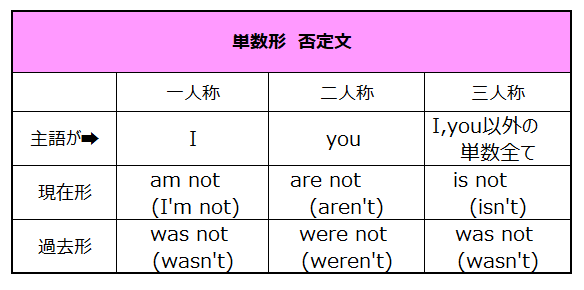
一人称:I am a student. 私は生徒です
(否定文現在形) I am(I'm) not a student.
(否定文過去形) I was not (wasn't) a student.
二人称:You are hungry
(否定文現在形) You are not (aren't) hungry
(否定文過去形) You were not(weren't) hungry.
三人称: He is my brother.
(否定文現在形) He is not(isn’t) my brother.
(否定文過去形) He was not(wasn't) my brother.
複数形

一人称:We are students.
(否定文現在形) We are not (aren't) students.
(否定文過去形) We were not (weren't) students.
二人称:Tom and I are hungry
(否定文現在形) Tom and I are not (aren't) hungry.
(否定文過去形) Tom and I were not (weren't) hungry.
三人称: David and Brian are at home.
(否定文現在形) David and Brian are not(aren't) home.
(否定文過去形) David and Brian were not(weren't) home.
2 一般動詞 現在形 と 過去形
be動詞以外で、動作を表す動詞
ポイントはたった2つ!!
過去形は did not (didn't)を付ける
② 現在形の三人称単数の否定文はdoes not (doesn't)
③ do not(don't) / does not(doesn't) のあとの動詞は「原型」

注意① 三単現の否定文は does not (doesn't)
現在形肯定文 I do my homework.
現在形否定文 I do not (don't) do my homework
過去形否定文 I did not (didn't) do my homework.
☆三人称単数☆
現在形肯定文 My father has a nice car
現在形否定文 My father does not(doesn't) have a nice car.
過去形否定文 My father did not (didn't) have a nice car.
② do not, does not, did not のあとの動詞は必ず「原型」
肯定文 My mother cooks dinner every night.
否定文 ✖ My mother doesn't cooks dinner every night.
否定文 〇 My mother doesn't cook dinner every night.
私の母は毎日夕食を作るわけではありません。
「毎晩つくりません」ではなく「毎晩つくるわけではない/毎晩は作らない」という意味
毎晩つくらないは=全く作らない
She doesn't cook dinner at all. 夕飯を全く作りません
または、She never cooks dinner.
肯定文 I slept well last night.
否定文 ✖ I didn't slept well last night.
否定文 〇 I didn't sleep well last night.
進行形の否定文
主語 + be動詞 + not + 動詞のing形・現在進行形:
・現在進行形否定文: 今~していません
・過去進行形否定文: ~していませんでした

未来形の否定文
1. 「be動詞+ not + going to」
2. 助動詞 「will not (won't)」
3. 「not going to」「will not」の後ろは必ず動詞の原型
1. not going to
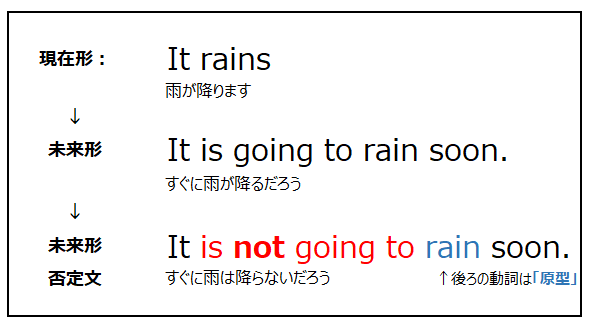
2. will not (won't)
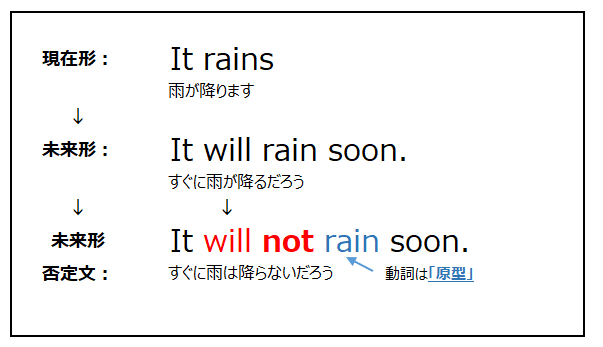
助動詞の否定文
①助動詞の後ろにnotを付けるだけ!!
②否定文の場合は「助動詞+not」のあとは必ず動詞の原形がくる
can not (can't) ~することができない
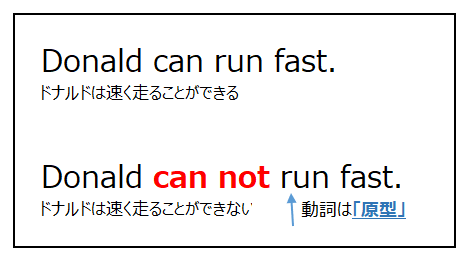
助動詞の否定文のcan not(can't)は be動詞+not able toに置き換え可能
Donald can run fast ➡ Donald is not able to run fast
*ただし可能をあらわすcan のみ
must not【義務】~してはいけない

I must study hard = I have to study hard
**ただし否定文は意味が違う!
do not have to ~しなくてよい
例:
You must not eat breakfast 朝食を食べてはいけません
You don't have to eat breakfast 朝食を食べなくてもよい
may not 【許可】~してはいけない 【推量】~ないかもしれない
【許可】~してはいけない
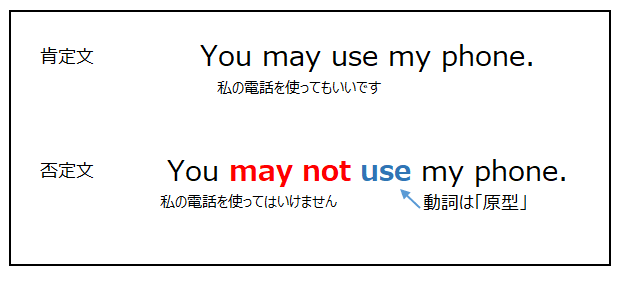
【推量】~ないかもしれない
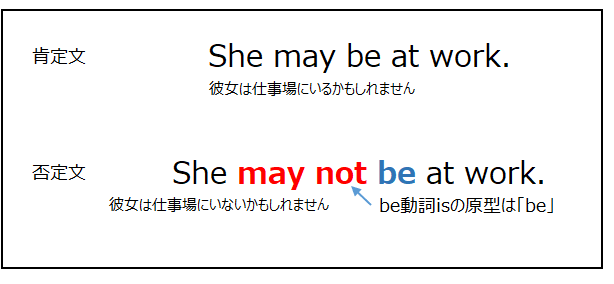
should not【義務】~するべきではない
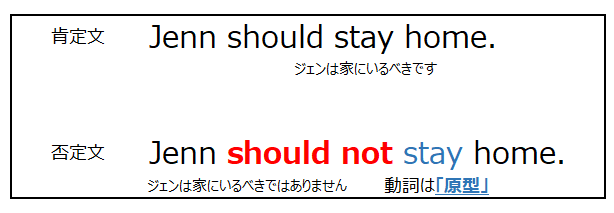

**may not とmust not はどちらとも「してはいけない」だが
must not 義務の否定形(絶対にしてはいけない)より強い
may not 許可の否定形(してはいけない)
不定詞 not を付ける位置で意味が変わるので注意!
不定詞にnotを付ける場合は 「not to ~」
① 名詞的用法の否定文
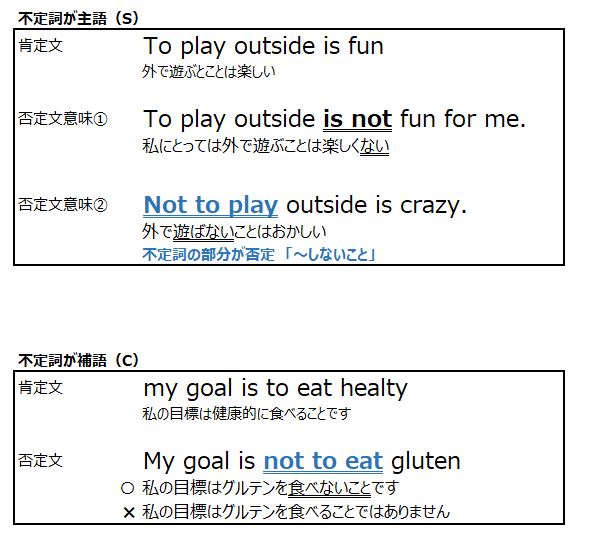
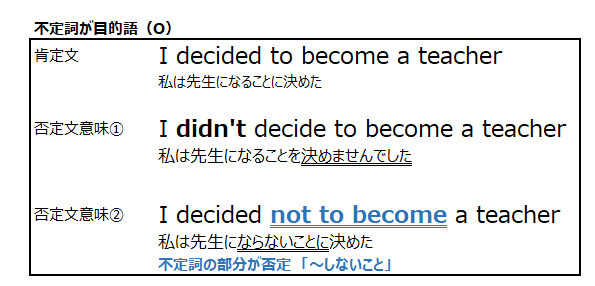
参考
to不定詞の基本を分かりやすく①「名詞的用法」| 英作文のポイントも
補語や目的語は文型のところで詳しく説明しています⇓
【わかりやすい】英語 第1文型~第5文型 例文で解説
② 形容詞的用法の否定文 (~するための、~すべき)不定詞が名詞を説明
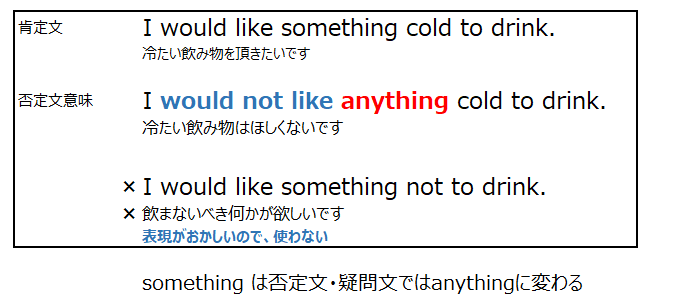
I have something to say to you.
I don't have anything to say to you.
I have nothing to say to you.
I don't have a lot of homework to do するべき宿題がたくさんない
She doesn't want a big house to live in 彼女は住むための大きな家が欲しくない
③ 副詞的用法 目的(~するために) / 感情の原因(~して嬉しい/悲しいなど)
【目的】の否定文
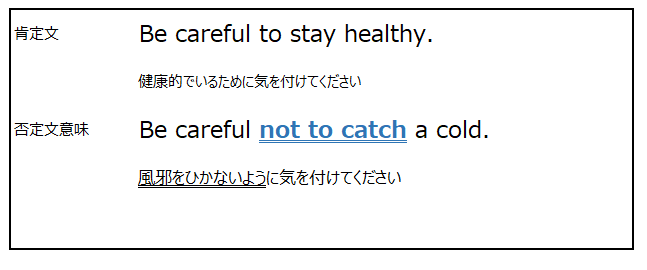
【感情】の否定文

不定詞_want 人 to / tell 人 to / ask 人 to の否定文
2. tell 人 to ~ 人に~をするように言う(命令)
3. ask 人 to ~ 人に~をするようにお願いする(依頼)
don't want 人 to ~ 人に~をしてほしくない / ~しないでほしい
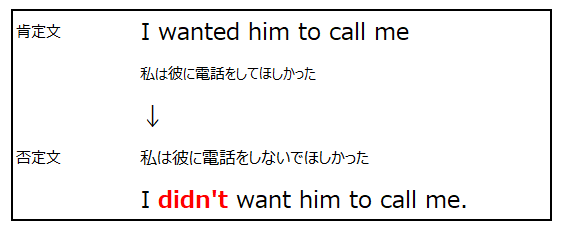
I wanted Ken to drive my car.
私はケンに私の車を運転してほしかった
↓
「私はケンに私の車を運転しないでほしかった」
✖ I wanted Ken not to drive my car
〇 I didn't want Ken to drive my car.
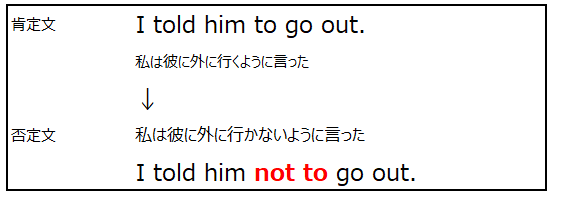
ちなみに、I didn't tell him to go out.
にすると、「私は彼に外に行くようにと言わなかった」になる

ちなみに、She didn't ask me to bring coffee
にすると、「彼女は私にコーヒーを持ってくるようお願いしなかった」になる
比較級の否定
② 比較級の否定文 (~よりも○○でない)
③ 最上級 (~で一番○○ではない)
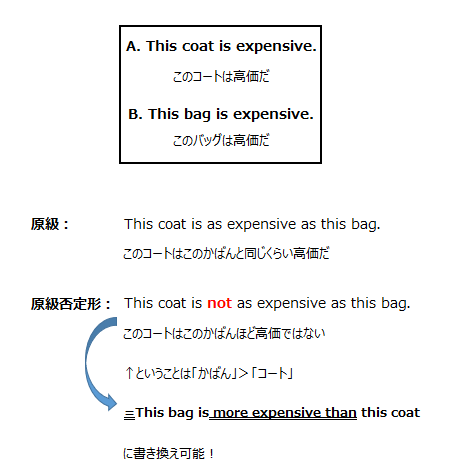
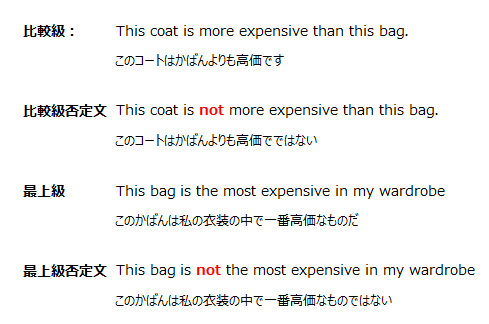
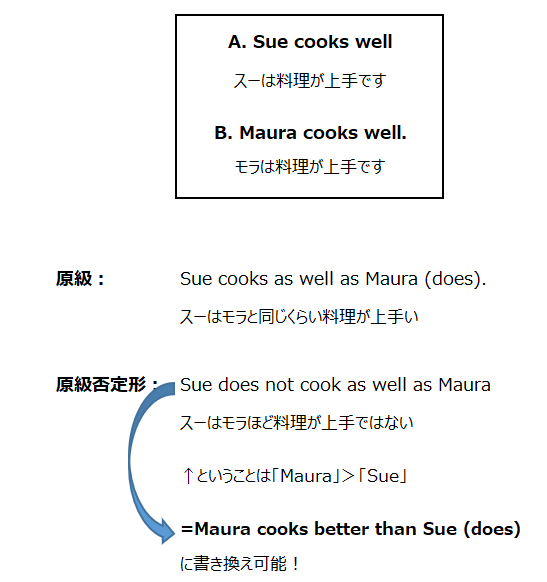

受け身の否定文
①be動詞+not+過去分詞 にする
② 否定形でも 過去分詞を使う


someone は否定文、疑問文になると anyone に変わる
② 不規則の過去分詞はこちら
完了形の否定文
主語+have (has)+not + 過去完了形 (短縮形で haven't / hasn't)
①継続
②経験 have never
③完了・結果
の大きく3つに分類される
① 継続「(ずっと)~していない」
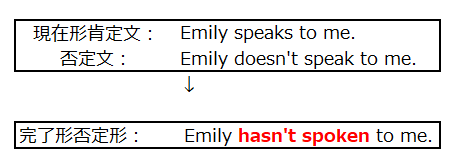
①「ずっと話していない」継続の否定文なのか、
②「話したことがない」経験の否定文なのか
③「まだ話していない」 完了・結果の否定文なのか分からないので
期間を表す
for ~ years (~年間)
for ~days (~日間)
for ~months(~か月間)
または~以降/以来を表す
since ~
を付ける

② 経験「~したことが(一度も)ない」


beの過去分詞been を使う。
肯定文 彼女は沖縄に行ったことがある
She has been to Okinawa

「before(過去に)」は完了形で経験を表すときによく使われる
③ 完了・結果「まだ~していない」

yet 否定文と合わせると 「まだ~していない」

Never について
・決して~ない 絶対に~ない
・少しも~ない
・一度も~したことがない、今までに~したことがないnever はこの単語そのものが否定形なので、文の構成は肯定形になる
この女性は少しも歳をとらない(老けない)
私は決して不誠実ではない
I am never going to see him again.
私もう二度と彼と会うことはないでしょう
I will never forget him.
彼のことは決して忘れません
あなたは決してその箱を開けてはならない
彼女は決して病院へ行きたがらなかった
母は私を一度も育てなかった。
受け身
I was never raised by my mother.
私は母に一度も育てられなかった。
私は一度も昆虫を食べたことはありません。
nothing について
・無、ゼロ 何もない
を意味する
neverと同様、nothingの単語そのものが否定形なので、文の構成は肯定形になる
nothing は not anything と置き換え可能 (主語がnothingの場合は置き換え不可)
彼にとって満足されられるものはない
=I don’t have anything to eat.
一日中寝るのと同じくらいいいものはない
=Nothing is better than sleeping all day.
おすすめ参考書
中学校3年間の英語が1冊でしっかり分かる問題集
中学校3年間の基礎英語がびっちり、もれなく解説されています。間接疑問は今では中学校で習う単元なので、基礎英語をしっかりと理解して活用できるおすすめの1冊です!







